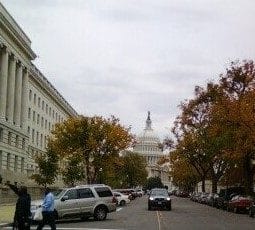The NAB has again addressed a Notice of Proposed Rulemaking from the FCC that would impose political AI disclosure rules on broadcasters by claiming the NPRM’s loudest supporters’ arguments are “inapposite or nonsensical.” The voice of radio and TV in Washington also has support from every state broadcasters association, and the top radio station ownership groups.
In reply comments, the NAB once again argues that the Commission lacks statutory authority to implement such regulations as these. It adds that, in its view, the proposed rules would not withstand legal scrutiny under the Administrative Procedure Act or the First Amendment. The comments build on the NAB’s initial 74-page stance.
“Given the insurmountable problems stemming from its lack of legal authority, the Commission cannot hope to enact rules effectively promoting the public’s ability to assess the substance and reliability of false, deceptive, and misleading AI-generated political ads,” the NAB argued. “Only Congress can address AI-generated political deepfakes across platforms and reach the advertisers creating political ads and thus should be the entity to take the lead in considering any needed regulatory action.”
As for the rule’s supporters who say it would not violate free speech, “These same commenters’ deficient First Amendment ‘analyses’ also failed to recognize, let alone address, the proposed rules’ burdens on broadcasters, candidates, and other speakers,” the NAB argued. “In short, commenters did virtually nothing to demonstrate that the FCC’s proposals would satisfy strict, exacting, or intermediate scrutiny or even rational basis review.”
The association noted that even some supporters of the FCC’s proposals acknowledge that the scope is overly broad and problematic.
A coalition of all 50 state broadcasters associations, as well as those representing the District of Columbia and Puerto Rico, also urge the agency to abandon its proposed rules. In their joint filing, they argue that the FCC’s proposals are “severely misguided,” would not achieve their intended goals, and could result in significant harm to broadcasters, advertisers, and the public.
“Adding the new education, inquiry, investigation, and disclosure requirements proposed in the NPRM would substantially increase the burden on stations,” the State Associations asserted. They emphasized that many stations operate with small staffs and are already under immense time pressure to comply with existing political advertising regulations.
They argue that focusing on the mere presence of AI in political advertisements is problematic, as AI can be used for both positive and benign purposes in ad production. “Damning a technology rather than a particular use to which it may be put is both shortsighted and harmful to the public, candidates, and, as collateral damage here, broadcasters,” they wrote. “That the Commission terminate this proceeding without adopting the proposals or any similar regulations suggested by commenters in this proceeding,” they wrote.
Meanwhile, a coalition of major radio and television broadcasters is making its voice heard in opposing the FCC’s proposed rules requiring disclosures for political advertisements containing AI-generated content.
Those filing comments on the NPRM include iHeartMedia, Cumulus Media, and Salem Media Group, among others. They join the existing pushback from NPR, all of who argue the FCC does not have the legal authority to enact such a rule.
In its own separate comments, iHeart argued that the proposed regulations would create confusion among voters, impose undue burdens on broadcasters, and potentially violate legal and constitutional principles.
“The NPRM’s proposals would create public confusion about the content of political ads and lead to a series of other unintended public interest harms,” iHeart said. “Telling listeners that an ad ‘contains information generated in whole or in part by artificial intelligence’ will only create confusion in most instances and will not provide audiences with the tools they need to ‘make informed decisions about the information in that ad.’”
iHeart also noted that the proposed rules would apply only to broadcast and cable platforms, putting radio operators at a disadvantage, stating, “Making matters worse, while consumers will confront disclosures on broadcast advertisements even if they contain no deceptive use of AI, consumers will not encounter disclosures on the platforms most likely to transmit deceptive content.”
While acknowledging the potential benefits of uniform federal rules governing AI use in political advertising, iHeart emphasized that, “Only Congress can enact broad legislation that covers all aspects of political advertising. Accordingly, only Congress can avoid a fragmented approach and the problems it would cause. The Commission is attempting to fit a square peg into a round hole, and even if it can do so, it would have disastrous results.”
Other radio operators – including Cumulus, Salem, Cox Media Group, WABC Radio owner Red Apple Media, and Alpha Media – joined a joint filing with TV broadcasters to share a similar message. They believe the rules would provide a “purely cosmetic solution at a considerable cost” and lead to unintended public interest harms. The Joint Broadcasters emphasize that the proposed rules would impose significant operational and financial burdens on radio and TV stations. “Stations usually have no contact with the entities that produce the creative, which are the only parties that definitively know whether an advertisement includes AI-generated content,” they noted.
Furthermore, the broadcasters express concern that the additional disclosures would consume valuable airtime, reducing the time available for political messaging. This could lead to increased costs for advertisers and potentially decrease the number of political ads aired, thereby limiting information available to voters.
Again, the Joint Broadcasters reasserted the NAB’s stance that, “Congress has not delegated such clear authority to the Commission.” They further contend that the proposed disclosure requirements would constitute compelled speech and fail to meet strict scrutiny under First Amendment analysis. “Rather than solving the problem, the rules proposed in the NPRM will just add another layer of complexity,” they stated.
The FCC will review the comments submitted during the now-closed public comment period before making a decision on whether to adopt, modify, or discard the proposed rules.




